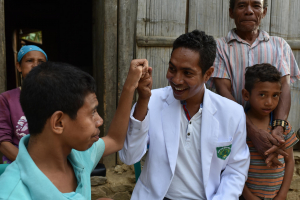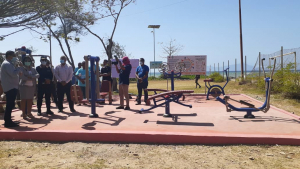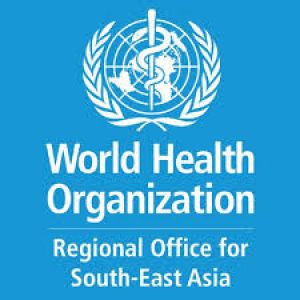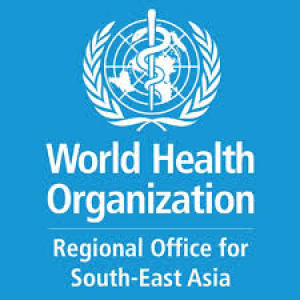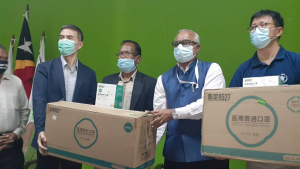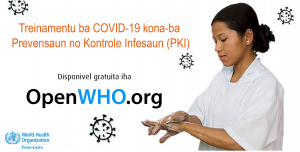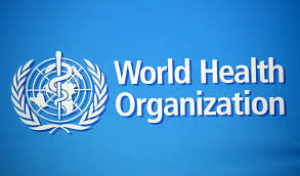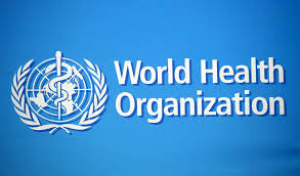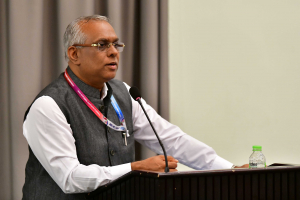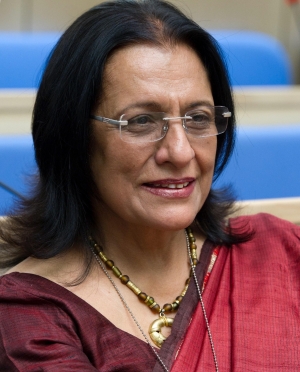Keep health workers safe to keep patients safe: WHO
September 17, 2020Tempotimor| (GENEVA) – The World Health Organization (WHO) is calling on governments and health care leaders to address persistent threats to the health and safety of health workers and patients.
Evita Moras Tensaun Iha TL, OMS Apoiu Ekipamentus Jinástika
September 12, 2020Tempotimor (Díli)- Organizasaun Mundiál Saúde (OMS) oferese ekipamentus jinástika ualu (8) ba Munisípiu Díli, ho intensaun, atu evita moras oi-oin iha Timor-Leste inklui tensaun.
Pandemic, essential health services to predominate discussions as Health Ministers of WHO South-East Asia Region meet this week
September 10, 2020Bangkok, 7 September 2020: Participating in the Seventy Third Regional Committee Session of WHO South-East Asia on 9 – 10 September, amidst the COVID-19 pandemic, Health Ministers from Member countries of the WHO South East Asia Region will discuss measures to curtail the outbreak, ways to maintain essential health services and transition to the ‘new normal’.
Reuniaun Ministru Saúde Sudeste Aziátiku ho OMS Foku Ba Restrisaun Surtu Covid-19
September 09, 2020TempoTimor (Bangkok) - Tuir komunikadu imprensa ne'ebe fo sai husi OMS informa ba ministru sira husi nasaun sira iha Rejiaun Sudeste Aziatiku ne'ebe partisipa iha Sesaun Komite Rejionál OMS Sudeste Aziátiku ba dala Hitunulu resin tolu iha loron 9 – 10 Setembru, iha pandemia COVID-19 nia laran katak, "Ministru Saúde hosi Membru estadu hosi Rejiaun OMS Sudeste Aziátiku sei diskuti kona-ba medida atu restrita surtu ne’e, maneira oinsá atu mantein servisu saúde esensiál no ‘tranzisaun’ ka muda ba ‘normál foun’.
Fundasaun Alibaba Apoiu Maskara Ba TL
August 12, 2020Tempotimor (Dili) - Fundasaun Alibaba liuhusi Repúblika Populár Xina no Organizasaun Mundiál ba Saúde (OMS) apoiu tan maskára N95 ho totál 10.800 no maskára serurjika hamutuk 60.000 ba Ministériu Saúde (MS) Timor Leste, relasiona ho surtu Coronavirus Disease 2019 (Covid-19).
WHO presents new course in Tetum on preventing COVID-19
July 23, 2020TempoTimor (Dili) - The World Health Organization (WHO) has developed a new course in Tetum which focusses on Infection Prevention and Control (IPC) for COVID-19. The course is designed to ‘educate health workers to be prepared and ready to respond to COVID-19,’ to teach them about interventions that ‘limit human to human transmission,’ and ‘how to identify, isolate and report suspect and confirmed cases,’ said Roderico Ofrin, WHO Regional Emergency Director.
COVID-19: Why Timor-Leste must keep the guard up
July 03, 2020By : World Health Organisation
In Timor-Leste, the last confirmed case of COVID-19 recovered on May 15, 2020. The majority of 24 confirmed cases was in well-defined clusters in government identified quarantine centres. All have made an uneventful recovery. There have been no deaths due to coronavirus in the country.
Husi : OMS
Iha Timor-Leste, kazu konfirmadu ba COVID-19 ikus rekupera tiha ona iha loron 15 Maiu 2020. Maioria hosi kazu 24 hirak ne’ebé konfirmadu, hela iha fasilidade kuarentena sira ne’ebé aloka hosi ita-nia governu. Sira rekupera ho di’ak no laiha problema. Iha nasaun laran seidauk iha mate tamba virus corona. Daudaun ne’e estratéjia ba teste ne’ebé mak haluan ona la hatudu katak iha transmisaun/da’et iha komunidade nia leet. To’o agora, kombinasaun hosi estratéjia imigrasaun ne’ebé diak, otél sira ne’ebé uza hanesan fatin kuarantena ne’ebé identifika hosi governu, kapasidade vijilánsia ne’ebé habelar hamutuk ho kapasidade ba teste ne’ebé hadook ita hosi virus ne’e. Maibé, ida ne laos ikus. Luta ba hasoru COVID-19 seidauk hotu.
Kazu ba moras ne’e aumenta beibeik iha mundu. Nasaun barak, kiak ka riku, hosi kontinente Ázia no Áfrika sai hanesan “hotspot” emerjente ba moras ne’e. Maibe, agora dadauk ita-nia preokupasaun boot liu mak ita-nia fronteira ho Indonezia. Risku boot ne’ebé kazu foun bele tama rai laran mak hosi fronteira ida ne’e. Tamba ida ne’e mak importante teb-tebes ba Timor-Leste nafatin hametin guarda no alerta nafatin. COVID-19 susar atu kombate hanesan saida mak ita hare beibeik akontese iha sidade no nasaun barak iha mundu tomak. Se ita la tau matan ka atensaun ba prevene no kontensaun, virus ne bele derepente da’et ba ema hotu.
Agora, oras to’o ona atu haree ba ita-nia an, saida mak Timor-Leste halo ona no saida tan mak ita presiza atu halo.
Timor-Leste simu ona apoiu hosi governu ho nivel a’as atu garante resposta ne’ebé maka’as ba krize ne’e. Hosi Gabinete Primeiru Ministru hala’o supervizaun ba buat hotu. Iha reprezentante ho nivel a’as hosi Sistema Integradu ba Jestaun Krize nian ba Ministeriu relevante sira.
Governu Timor-Leste nian introdús intervensaun balun ho lais no bo’ot ne’ebé ajuda atu prevene virus corona aumenta beibeik no transmisaun/da’et iha komunidade nia le’et. Dalan tama mai Timor-Leste sei nafatin la arbiru ka restritu. Fasilidade ba izolamentu identifikadu ona hadi’ak ona ho lalais atu tau matan ba pasiente moras COVID-19. Pesoál saúde, ekipa ba apoiu pesoál no pesoál atende ba emerjénsia nian sira ne’ebé treinadu hotu ba oinsá tau matan ba pasiente sira no iha tempu hanesan proteje sira nia an. Teste laboratóriu nian mós introdús ona iha rai laran, kapasidade vijilánsia habelar no “web-based” sistema vijilánsia ne’ebé komesa. Responde ba saude nian kaer hosi Ministru Saúde suporta hosi parte interisada ne’ebé organiza hamutuk ho pilar sia ne’ebé rekomenda hosi OMS.
OMS oferese suporta tékniku no lojistika. Sira servisu hamutuk ona ho ajénsia ONU ho parseiru bilateral sira atu fornese ekipamentu ba teste laboratóriu, ai-moruk no hadia infrastrutura.
Defatu, tuir kedas kazu konfirmadu ba dahuluk iha 21 Marsu 2020, Timor-Leste sai hosi nasaun ida menus kapasidade ba teste nasionál ba COVID-19, laiha fatin izolamentu no fasilidade ba kuarantena ne’ebé aloka, kapasidade ba sistema vijilánsia ne’ebé limitadu to’o sai nasaun ida ne’ebé iha teste iha rai laran, fasilidade izolamentu no kuarantena ba COVID-19 ne’ebé la’o diak, ekipa ne’ebé trainadu kona-ba kontrolu no oinsá tau matan ba pasiente, estoke ba EPP ne’ebé aumenta ba beibeik no kapasidade ba vijilánsia ne’ebé lao nafatin iha de’it semana 5-6 nia laran.
Maske nunee, buat ne’e hotu sei difisil atu hetan se laiha suporta hosi povu. Governu koko hela de’it atu iha relasaun ne’ebé diak no iha fiar atu nune’e komunidade bele tuir restrisaun ne’ebé iha. Ajuda finanseiru mós fornese hosi governu atu bele suporta família sira iha oras susar ida ne’e nia laran. Komunidade sira besik fronteira no xefe suku sira ajuda nafatin ho vijilánsia ba komunidade liuhosi hatoo informasaun kona-ba entrada ilegál hosi “jalan tikus” hosi Indonezia atu nune’e ofisiál saúde sira bele foti asaun lalais.
Timor-Leste nafatin tuir maka’as politika ‘teste, kura, izola, buka tuir no kuarantena’ nebe’e mak hetan rekomendasaun hosi OMS. Numeru ba kazu bele aumenta se sistema saude nian fraku. Iha tempu hanesan, ita mós presiza kontinua esforsu atu hadia kualidade no kuantidade ba fatin no fasilidade ba izolamentu no kuarantena. Importante tebtebes mós atu haforsa kapasidade ba teste laboratóriu no kapasidade ba vijilánsia nian. Esforsu hamutuk tenkesér kontinua atu garante pesoál saúde esensiál sira la sofre tamba kontrolu ba pandemia ida ne’e. Agora, tamba restrisaun ba fronteira ladun makaas ona, presiza aumenta vijilánsia. Importante tebtebes atu tau matan makaas ba fronteira rai nian no pontu entrada sira seluk. Importante mós atu lolo liman ba komunidade atu nunee sira hetan informasaun ne’ebé loos no sira bele sente iha suporta no seguru.
Importante atu labele haluha katak, laos governu mesak mak funu hasoru virus. ema ida-idak iha komunidade kna’ar ba sira nia an rasik no sira nia família liu hosi halo tuir regras sira: fase liman beibeik; labele kaer matan, inus no ibun; hadook an hosi fatin ne’ebé iha ema barak; distánsia fíziku; uza máskara bainhira iha fatin ne’ebé mak susar atu iha distánsia fíziku no halo tuir ijiene respiratóriu ne’ebé diak. Hela iha uma no izola an to’o diak maske ho sintomas kmaan, hanesan; me’ar, ulun moras, isin manas. Se ita sente moras no sente isin manas makaas, me’ar no susar atu dada iis buka atendimentu médiku, atu nunee bele hetan avaliasaun didi’ak no mós teste, se presiza. Importante mós ba komunidade atu buka tuir informasaun hosi fontes kredivel hnesan Ministeriu Saúde ka OMS.
Op-ed hosi Dr Rajesh Pandav, Reprezentante OMS ba Timor-Leste
Tinan-tinan, iha loron 31 Maiu, Organizasaun Mundiál Saúde (OMS) no parseiru global hotu selebra Loron Mundiál Sein Tabaku (Sigla Inglés: World No Tobacco Day) hodi bolu atensaun hosi mundu tomak kona-ba epidemia tabaku nian. Tinan ida ne’e Loron Mundiál Sein Tabaku mai ho objetivu atu proteje labarik no adolexente sira hodi manipulasaun industria no prevene uzu tabaku no nikotina entre sira liuhosi estratejia fo’er fó servisu ba adolexente sira iha industria tabaku hodi promove tabaku nia produdu liu-liu iha adolexente sira-nia leet.
Together, forward in the fight against COVID-19
May 09, 2020By Dr Poonam Khetrapal Singh, WHO Regional Director for South-East Asia
Three priorities must chart the path ahead: control and suppress spread, strengthen and maintain health services, and support each other to stay safe, healthy and well
The WHO South-East Asia Region is entering a new phase in its pandemic response. In recent weeks the spread of COVID-19 in the Region has slowed, due in large part to the unprecedented physical distancing measures that countries implemented early and aggressively. Several Member States are now preparing to safely transition towards a “new normal” in which social and economic life can function amid low disease transmission. To do that successfully, countries must continue to be bold, decisive and mobilize the full power of their whole-of-government, whole-of-society approaches.
Our challenge is immense. Across the globe, the spread of COVID-19 continues to cause disease, death and disruption. It has pushed even the most advanced health systems to the brink. The crude mortality ratio for COVID-19 is estimated to be upwards of 3%, but can change from country to country, and even within countries. Key variables include access to care and the availability of testing.
VIDEO PUBLISIDADE APELU HUSI PM TAUR APLAUS BA FRONT LINE
The Region’s Member States must continue to take evidence-informed action and conduct careful risk assessments prior to making decisions on winding back public health and social measures. Among other factors, due consideration should be given to the local epidemiology of COVID-19, including identified hot-spots and clusters, and the capacity of systems and responders to find, isolate and care for cases, and quarantine contacts.
Whatever a country’s current transmission scenario, there can be no illusions: We are in this for the long haul. In what will be an ongoing struggle against COVID-19, Member State strategies must be clear, comprehensive and cover immediate and long-term needs. Three priorities must chart the path ahead: control and suppress spread, strengthen and maintain health services, and support each other to stay safe, healthy and well.
To control and suppress spread, we must take the fight to the virus. Active case detection, isolation, testing and contact tracing can control the virus. Should community transmission occur, they are vital to suppressing it. Strengthening surveillance and contact tracing in particular will help national and local authorities to rapidly adapt to evolving outbreaks, whether moving from one case to a cluster of cases, or from a cluster of cases to no cases.
PUBLISIDADE
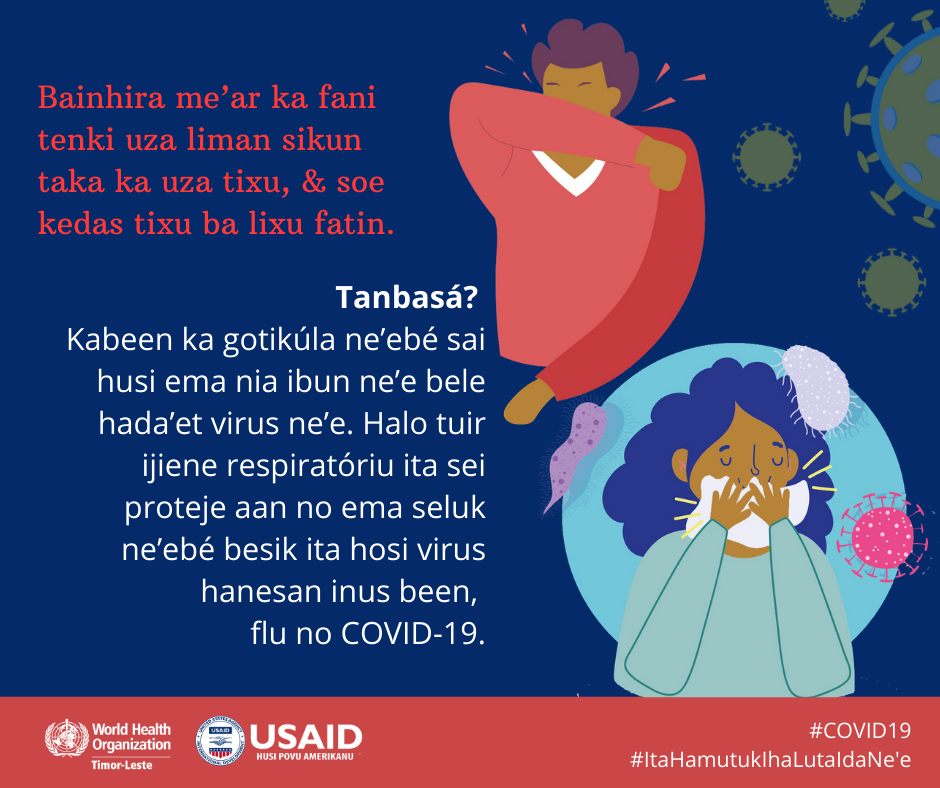
Agility and innovation will be crucial, especially at the sub-national level, across borders and with mobile populations. For areas with limited transmission, responders must focus on finding and isolating all cases, providing them with appropriate care, and tracing, quarantining and supporting all contacts. Where sustained transmission occurs, they must aggressively slow and reduce it to manageable clusters, for which they may consider reintroducing physical distancing measures in a way that minimizes negative impacts.
To strengthen health services, all countries must first protect health workers. WHO continues to work with governments, industry and the Pandemic Supply Chain Network to overcome global shortages of personal protective equipment. It is imperative that health workers have the gowns, gloves, medical masks and eye protection required to save lives and avoid infection.
Countries must continue to expand isolation and ICU capacity, while also rationalizing it. By networking COVID-19 treatment facilities, health leaders and administrators can better share the burden among facilities. By implementing clear triage protocols, they will ensure all patients with severe manifestations are provided safe, rapid admission to intensive care units. Rigorous infection prevention and control is needed to prevent health facilities from facilitating transmission.
PUBLISIDADE
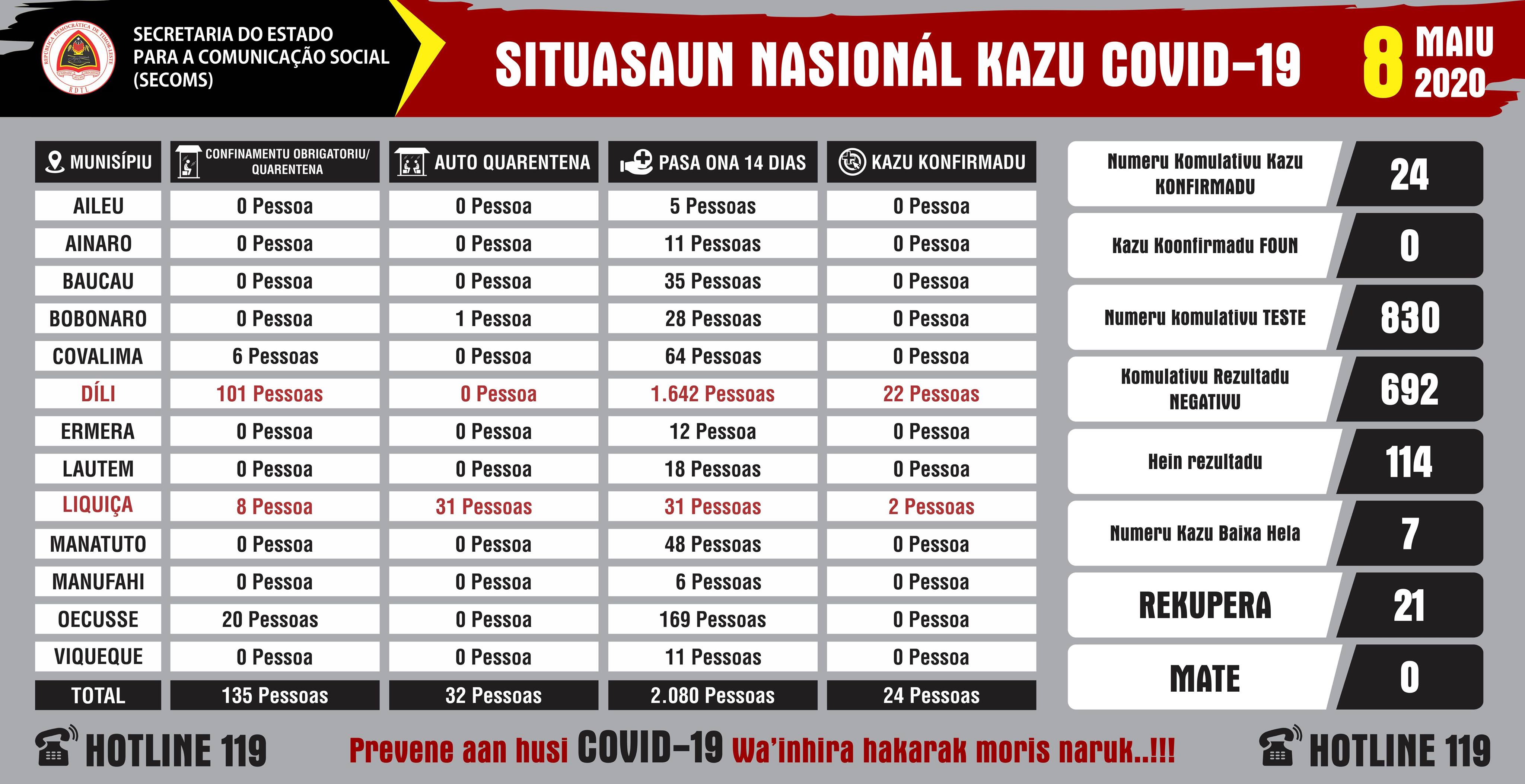
Ensuring essential health services are maintained is vital. We must not only reduce mortality from COVID-19 itself, but also from vaccine-preventable diseases and other treatable conditions that can increase when health systems are overwhelmed. WHO will continue to support countries in the Region to implement key WHO guidelines on maintaining essential health services as they directly respond to COVID-19.
To achieve these outcomes, Member States must mobilize a whole-of-government, whole-of-society approach that highlights each person’s role in supporting one another to stay safe, healthy and well. Regular hand-washing, coughing or sneezing into one’s elbow, and avoiding contact with people with flu-like symptoms are crucial to staying healthy. So too is following local and national guidance on physical distancing. Avoid using tobacco, alcohol and other substances that impair the immune system and damage health. Support health workers and say no to stigma.
We must also stay well. Look after your mental health and be supportive of others. It is natural to feel sad, stressed, confused, scared or angry during a crisis. Helpful coping strategies include getting sufficient rest, exercise, eating well, avoiding harmful substances and staying in close contact with family and friends. WHO will continue to provide accessible and actionable information on coping with COVID-19-related stress and anxiety, and will support all Member States to strengthen mental health services as part of the COVID-19 response.
We must continue to stand together to tackle what is the greatest public health challenge of a generation. The Region’s strategy to control and suppress spread, strengthen and maintain health services, and support each other to stay safe, healthy and well, will help all countries to save lives and minimize impact. Our mission is clear. Our challenge is great. Together, forward in the fight against COVID-19.
PUBLISIDADE
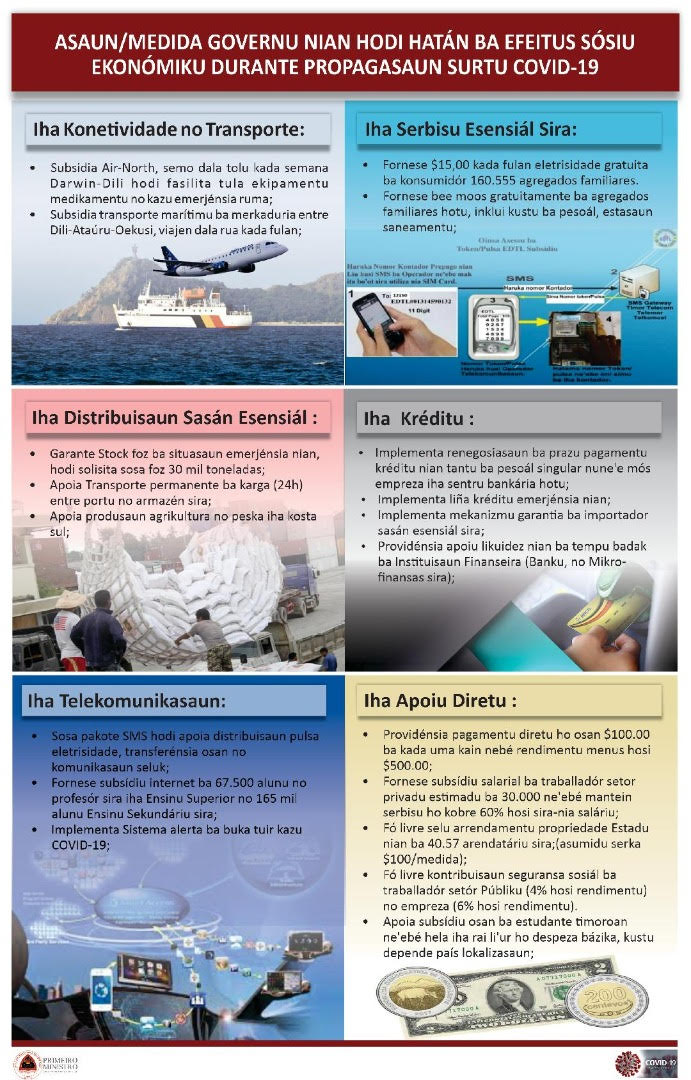
in English
Popular
Error: No articles to display
.



